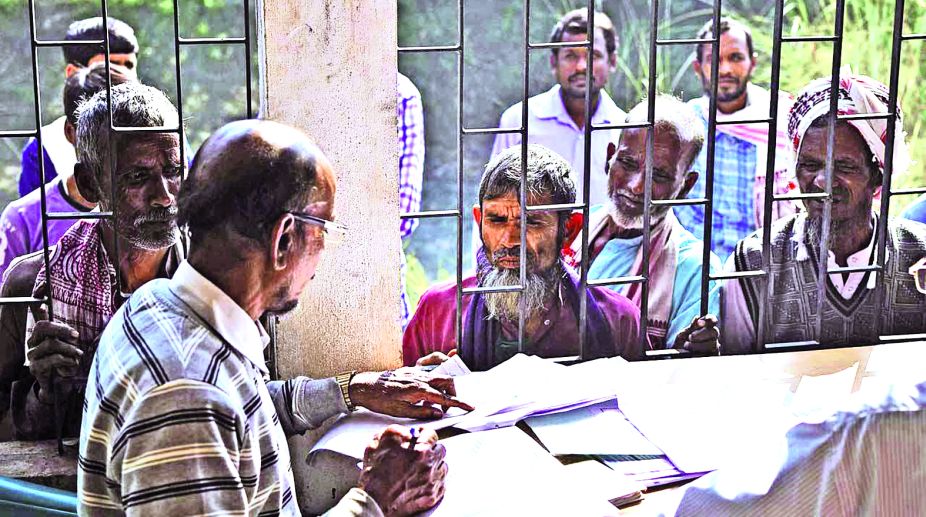Assam is staring at a very difficult future. On one hand is the finalisation of the National Register of Citizens, which has seen quite a good number of people with genuine citizenship claims somehow falling between the cracks because they cannot produce documents. On the other, is the Citizenship Amendment Bill 2016, which the Modi government wishes to pass that would allow Hindus persecuted in other countries, especially Bangladesh and Pakistan, to be given citizenship rights in India.
That this move is purely for the purpose of consolidating Hindu votes, and has nothing to do with a fraternal feeling for non-Indian Hindus, is clear. The BJP came to power in 2014 on the promise that illegal immigrants from Bangladesh — an emotive issue that been at the centre of several controversies and even saw a mass movement in Assam in the 1980s — would be deported.
Advertisement
It’s a different matter that this has not happened even though the BJP has been in power in Assam since 2016. On the contrary, Assam now has to contend with the Citizenship Bill, which has raised the hackles of the Assamese-speaking people. Already several groups have said they would petition the visiting Parliamentary Committee, which is soliciting views from different state governments.
Social media is rife with discussions on the issue. What is clear is that the people of Assam do not want to be burdened with Bengali Hindus from Bangladesh as much as they want the Bangladeshi Muslims who are illegal migrants to be sent back. A migrant is a migrant, they say and should never be treated at par with genuine Indian citizens or threaten their future. Already Assam and adjoining states are facing pressure over land and resources due to incessant influx from Bangladesh.
What is unfortunate today is that the migrants — illegal or otherwise— have been defined by their religion and one group is being treated with kid gloves while the other is demonised. All this has started with BJP’s divisive politics, which is reopening past wounds. Now society is completely fragmented into Assamese and Bengalis — Hindus and Muslims and of course, exacerbating the divide between the Assamese-dominated Brahmaputra Valley and the Bengali-populated Barak Valley.
In India we have spoken of deportation of illegal Bangladeshi migrants as if it is within our control. Bangladesh has, times without number, denied the presence of their nationals in Assam/India. And without valid documents how can anyone prove whether a person is from India or Bangladesh when there are no distinguishing features.
And the BJP agenda is clear — it is playing its Hindutva politics to the hilt. They want to grant citizenship to Hindus persecuted in Islamic countries as if India is a “Hindu” country. The BJP forgets the secular nature of the Indian Constitution. How does it matter if the foreign settler in our country is a Hindu or Muslim? They would be eating into our scarce resources anyway. And why create this divide on the basis of religion?
The Modi Government has camouflaged its desire to consolidate the Hindu vote bank by also including in the Citizenship (Amendment) Bill, 2016, the power to grant citizenship rights to “illegal immigrants” who are Hindus, Sikhs, Buddhists, Jains, Parsis and Christians from Afghanistan, Bangladesh and Pakistan. One has hardly ever heard of Sikhs, Jains or Christians being persecuted for their religion anywhere. So, clearly the intention is to grant citizenship rights to non-Muslim immigrants from Bangladesh who came in after 1971 when Bangladesh was created and they were ostensibly persecuted.
In Meghalaya, the present National Peoples’ Party-led government, with two BJP legislators on board, has categorically said “No” to the Bills. Even civil society groups have opposed it. Other North-eastern states, barring Assam, are likely to take similar stances. So it will only be Assam that will find it difficult to defy Modi.
Strong voices of dissent have emerged from the dominant Assamese community. Their contention is that Para 5.3 of the historic Assam Accord. signed on 15 August 1985, between the Indian Government led by Rajiv Gandhi and the All Assam Students Union and the All Assam Gana Sangram Parishad, says that foreigners, who came to Assam after 1 January 1966 up to 24 March, 1971, shall be detected in accordance with the provisions of the Foreigners Act, 1946, and the Foreigners (Tribunals) Order, 1964. The Accord does not categorise an illegal migrant on the basis of religion. Hence the Citizenship (Amendment) Bill 2016 completely trashes the terms of the Assam Accord.
In Assam, memories of bloodshed during the Assam movement, which sought to push out illegal Bangladeshi immigrants, is still fresh and there are tensions between the Assamese and Bengali speaking population in the two major river valleys. It has taken a while for the two communities to be civil with each other. The controversial Citizenship (Amendment) Bill will again drive a wedge between the two communities and it will be a long and bitter fight for some to establish their citizenship because they have left everything behind when they came to India right from the time of Partition (1947) and thereafter. Bengali Hindus who are victims of Nehru’s decision to cede Sylhet to East Pakistan and who fled to India thereafter and then in 1971 because of the genocide, are in full support of the Bill.
The BJP believes it can neutralise the Muslim population growth by countering it with imported Bangladeshi Hindus. It is a weird, populist logic but is designed to win votes, any which way we look at it. As of today, the Bengali Hindus outnumber the Muslims in the Barak Valley by a mere two per cent, according to the 2011 Census.
Today, the people of Assam are caught in a bind. They accuse the Congress of having given succour to illegal Bangladeshi Muslim migrants over decades, merely to guard their vote banks. The Asom Gana Parisah, an offshoot of the anti-foreigner movement of the late 70s and early 80s under the banner of the All Assam Gana Sangram Parishad and the All Assam Students Union, is now reduced to a pitiable number in the State Assembly. People realise that looking up to this party to counter the Congress or BJP is futile, also because the AGP is sharing power with the BJP in Assam today. Indeed the situation is so volatile and the public mood so belligerent that if the NRC is released it could lead to a law and order situation of humungous proportions, unless chief minister, Sarbananda Sonowal shows the kind of leadership needed at this time.
Meanwhile, Himanta Biswa Sarma, the number two person in the Assam cabinet but a man who is believed to have led to the BJP victory in Assam made a strange statement recently. He said the Bangladeshi Hindus will be allowed citizenship in Assam in order to counter the Bangladeshi Muslims in numbers. If politics is all about religion and consolidation of Hindu votes, the only objective of the BJP then in the North-east is in danger of being subsumed by Bangladesh. This is the real threat today.
As stated earlier, the BJP in Assam struck an alliance with the AGP in 2016 as it did not have absolute majority. The AGP has 14 MLAs in the current legislature. The AGP has said it will break away from the alliance if the Citizenship Bill receives the assent of the Assam Assembly. But this is neither here nor there. Of what use will it be then for the AGP to move out of the BJP alliance? The damage would have been done by then.
But that is the problem with being in power after such a long time. The AGP was in the dog house for 15 years when Assam was ruled by the Congress. In that time the party has virtually withered. Its ability to hang on to the apron strings of the BJP this time has given it some traction. It remains to be seen what happens to this party on which the people of Assam had pinned their hopes in the 1980s. Politics truly is the last refuge of power seekers.
Meanwhile, Assam looks like a cauldron where the outrage over the NRC and the Citizenship Bill might find expression in violence.
The writer is Editor of the Shillong Times and can be contacted at patricia.mukhim@gmail.com











